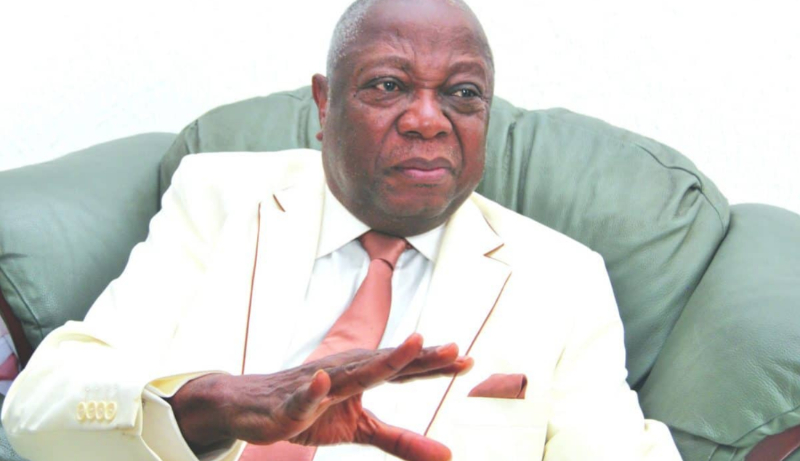Former Minister of Finance, Budget and National Planning, Dr Anthony A. Ani, yesterday urged the federal government to learn from the economic policies of former Head of State, late Gen. Sani Abacha, to overcome the present economic challenges bedeviling the country.
He made the suggestion the 2nd Gen. Sani Abacha colloquium which was organised by Centre for Political Research, Education and Development (CEPORED), with the theme, “Towards Evolving a Home Grown Solutions to Nigeria’s Challenges.”
Apart from Abacha’s administration, Ani observed that no regime in Nigeria’s history had a bumpier ride almost from the first quarter of its existence, including oil strike, urban riots, election boycotts, ultimatum to pack and leave, call for sovereign national conference, sanctions and rumours of sanctions all against the backdrop of sustained local and international efforts to delegitimise the government of the late head of state.
He said: “It is therefore pertinent to ask why despite all these problems, the economy did not collapse. Why did the adverse economic situation give way to macro-economic stability that had become the toast of the World Bank and International Monetary Fund (IMF)? This is the Abacha Miracle.
“Abacha Miracle was a phrase coined on the streets by those ordinary people who appreciated the wonderful works and achievements of that short period of the Abacha government in which jobs, businesses and smiles were on the faces of many Nigerians.
“Having gone through difficulty and hardship imposed by Structural Adjustment Programme (SAP) and the turn around to good times experienced,” the former finance minister explained.
He noted that in November 1993 when the Interim National Government was declared illegal, and Abacha emerged, the country was running at an inflation rate of 87 percent; negative growth rate of -1.5 percent, the country was in recession, the oil price was $18 per barrel, the interest rates hovered around 25 percent and a debt overhang of $30 billion among others.
“Five years later in 1998 with strict financial discipline, we were able to maintain stable exchange rate of ₦82 to $1 throughout, and the Naira was internally convertible; we were out of recession within six months.
“Our external reserves went up to $7.7 billion including Excess Crude Account of about $3 billion; inflation rate was reduced to 6.5 percent; 13 percent Derivation was introduced.”
On his part, former Minister of Justice and Attorney General of the Federation, Kanu Agabi (SAN) said that for Nigeria to have a growing and sustainable economy, home-grown solutions starting from the shutting of borders as was adopted by world powers that have grown from nothing, should be employed.
According to him, to achieve this, Nigerians must talk less, eat less, work more and produce what the nation needs from time to time.
Agabi who delivered the keynote speaker, said it is unfortunate that the attitude of flattery has been enshrined in the Nigerian culture and with elected leaders always waiting to be flattered before they can perform.
Lamenting the poor state of the Nigerian situation with regards to education and legacy, the former minister said that the present education Nigerians are exposed to, is one that makes them proud, and not one that has qualities to equip them for life.
“We must shut the borders to have home-grown solutions. Take a look at China, for her to become a powerful nation, she had to shut down her borders. Without this, we cannot have home grown solutions.
“The problem of the nation really, is that we are eating too much, and we talk too much. The nation must eat less and work more. Government at the national, state and local government level are centred on patronage.
“You have to know the president, governor or ministers and that has been entrenched in our culture, the culture of flattery. We are an intelligent people, patient, God-fearing resilient and unrelenting, but we must put those talent to use. Nigeria is hurrying her talent. A nation without a sense of history and is divided cannot attain greatness.
“Stop branding the nation as an artificial entity created by the British. All nations are artificial including America and Britain. If you regard the nation as a broken vehicle, you must remember that you have only one. Repair it and move on. Government bus founded on the constitution and you cannot afford to reject it.
“We must give our children the kind of education that will equip them for life. What we give them today is education that makes them proud. Our elections are not free and fair. Until they are, we will not be able to produce credible leaders for the nation.”
In the same vein, Kebbi State, Abubakar Atiku Bagudu, observed that although Abacha was always misrepresented, home-grown solutions had been his economic qualities.
Bagudu, who described the late general as a pan-Africanist, said Abacha meant well for the nation and was able to stabilise it with policies he put in place.
He also said that during his tenure, the exchange rate of a dollar to naira was N22 and lessons from nation’s under sanctions from the West were adopted and the economy was good.
“He is been misunderstood and this is agonising for the family and to some of us. Abacha adopted home-grown solutions and this worked for the Nigerian economy. However, home-grown solutions include risk taking.
“Abacha gave his best to Nigeria and it was remarkable that with so little resources, reserves were $750 million and exchange rate was stable. A dollar was equalled to N22 naira,” Bagudu said.
SOURCE: https://www.thisdaylive.com/index.php/2022/10/23/ex-finance-minister-urges-fg-to-learn-from-abachas-economic-policies/


